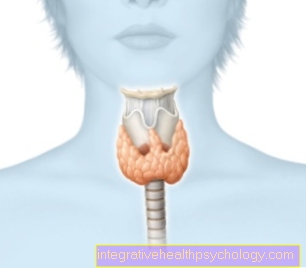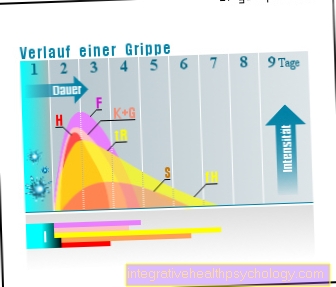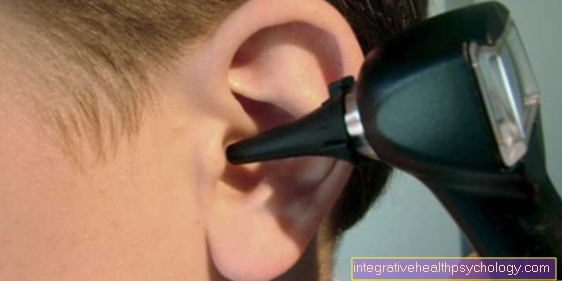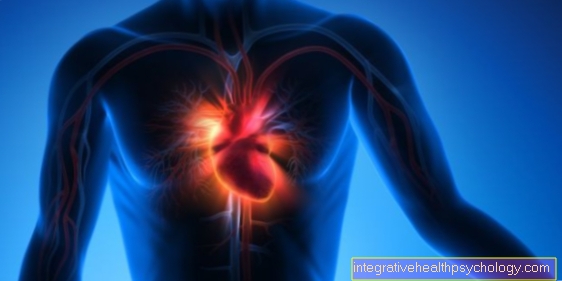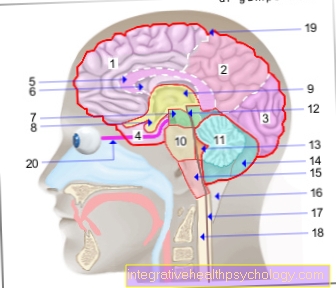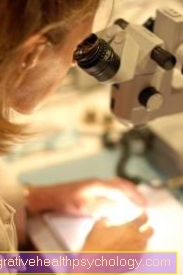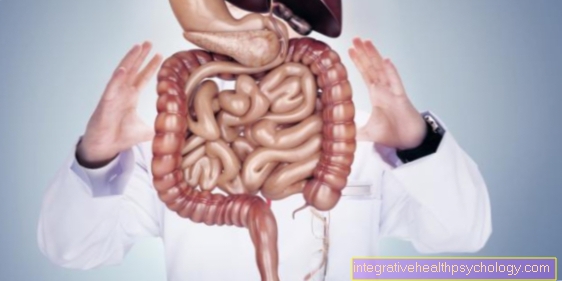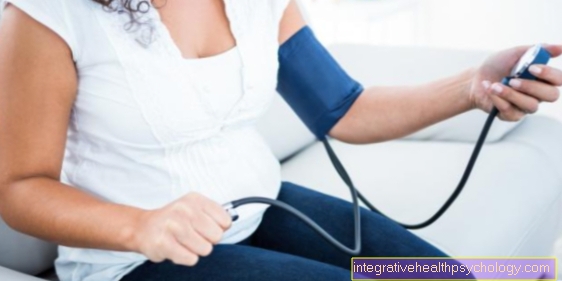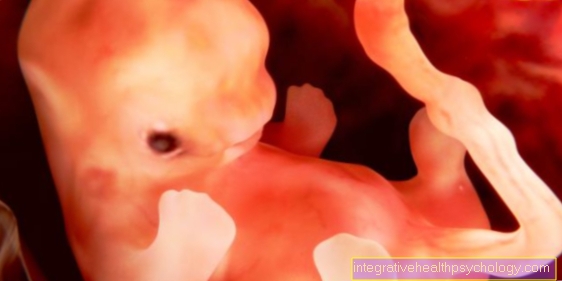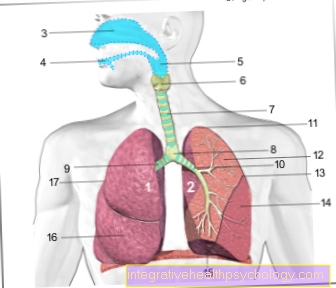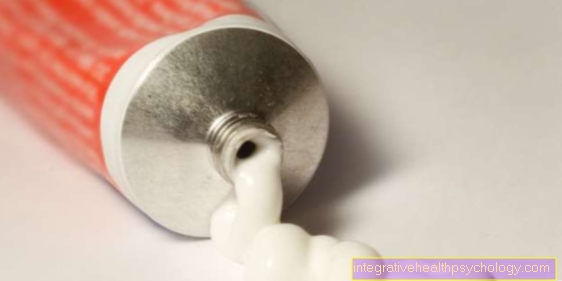Signs of an existing pregnancy
introduction
The first signs of pregnancy that appear can vary from woman to woman, or be differently pronounced.
For many women, the first sign of pregnancy is the absence of a monthly menstrual period. If there are other typical signs of pregnancy, it is very likely that you are pregnant.
A pregnancy test such as Clearblue® can be used on the first day of the missed period at the earliest. At this point in time, the test result is not very meaningful. In order to be able to determine a pregnancy with certainty, an examination by the gynecologist should be carried out.
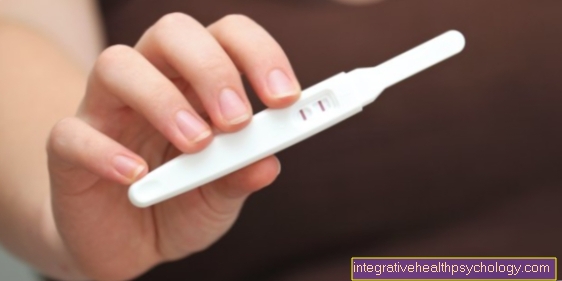
Typical signs of pregnancy
The first significant sign of pregnancy is usually the absence of a menstrual period. The hormonal changes in the female body can lead to further signs even at the beginning of pregnancy:
- Morning sickness: usually occurs between the 6th and 12th week of pregnancy and in most cases disappears afterwards
- Pulling in the lower abdomen or abdominal cramps: can occur at the beginning of pregnancy when the egg cell implants.
- Changes in the breasts: there is often a feeling of tension in the breasts, the breasts are more sensitive to touch and the area around the nipples becomes darker. This is to prepare the woman's body for later breastfeeding. Some women leak milk during pregnancy.
- fatigue
- Discharge, frequent need to urinate
- Cravings or disgust for certain foods
- Rise in body temperature: is often described by pregnant women as a pleasant feeling of warmth.
- Mood changes: Women in pregnancy are more likely to be more emotional. Irritation or mood swings can also occur due to hormones, but often disappear again as the disease progresses. There can also be an increase in sexual desire because the genital region of the pregnant woman is better supplied with blood.
Read more about: Pregnancy symptoms and When does the belly grow during pregnancy
Tension in the chest
Tugging in the breasts can occur at the beginning of pregnancy. The reason for this are the hormonal changes during pregnancy, which lead to breast growth or remodeling processes in the breast. The aim is to prepare the breasts for milk production and breastfeeding.
The strong growth of the breasts can lead to a more or less strong pulling of the breast, which often leads to the breasts becoming very sensitive to touch. Increased throbbing or tingling, especially when touched, also occurs in some women. Both the pulling and the other complaints usually go away again in the course of pregnancy.
Read more on the topic: Breast pain in pregnancy.
Can diarrhea be a sign of pregnancy?
The hormonal changes can affect the pregnant woman's entire body. Pregnancy can therefore also affect the gastrointestinal tract. Hollow organs such as the stomach and intestines are widened by the influence of hormones and are therefore often restricted in their function.
The decreased activity of the bowel can lead to diarrhea. However, this can also lead to the opposite and it can lead to constipation and gas. In general, however, diarrhea can have many causes and cannot be judged as the sole sign of pregnancy.
Can pimples be a sign of pregnancy?
Due to the changes in the hormonal balance during pregnancy, changes in the appearance of the skin can occur, especially in the first few weeks. On the one hand, pimples and blemishes can occur more frequently. This can lead to acne. However, the opposite effect can also occur and pimples can go away in women with previously blemished skin.
Read more on the topic: Skin changes during pregnancy.
At what point does a woman notice that she is pregnant?

The point in time at which a woman realizes that she is pregnant varies greatly and depends, among other things, on whether the pregnancy is planned or not.
A woman who wants to have children pays more attention to her body, is more likely to notice small changes and associate them with a possible pregnancy.
It is often different in women for whom pregnancy is unplanned and can be traced back to a failure of the contraceptive, for example. This woman will not immediately associate the initial signs of pregnancy, such as breast twitching, with pregnancy.
Some women say that they already notice the pregnancy when the egg cells implant itself in the lining of the uterus, i.e. a few days after fertilization. Basically, the fertilized and nested egg starts to produce the pregnancy hormone about one to two weeks after fertilization. This corresponds to the 3rd or 4th week of pregnancy. From this point on, women may notice hormone-related changes in their bodies, such as breast growth, nausea, and fatigue, which are related to pregnancy.
Pregnancy signs before the missed menstrual period
Some women notice that something has changed in their body even before they miss their period and suspect that they are pregnant. Since the first early signs of pregnancy are often similar to the symptoms associated with menstruation, they cannot always be differentiated from one another. Often times, it is the changes and growth in the breasts that appear as one of the first signs of pregnancy. In some women, these occur even before NMT and indicate a possible existing pregnancy. Furthermore, pronounced tiredness or an aversion to certain foods or smells can also be early signs.
Read more on the subject below: Differentiating Premenstrual Syndrome from Pregnancy
Signs of pregnancy after ovulation
After ovulation, the egg cell is viable for about 12 to 24 hours and must meet a sperm cell during this time in order to be fertilized. Once fertilization has taken place, the female body begins to switch hormone production so that the lining of the uterus is prepared for the impending implantation of the fertilized egg. Signs of pregnancy usually do not appear by then.
About a week after fertilization, the fertilized egg then nests in the uterus. In women, this can manifest itself in abdominal pain and spotting, which are considered the first signs of pregnancy.
This is followed by the usual signs of pregnancy, such as breast tenderness, nausea, fatigue and mood swings caused by the hormonal changes.
Signs of pregnancy despite taking birth control pills
The pill is the most widely used and the safest contraceptive. The certainty that pregnancy will not occur if the pill is taken correctly is around 99.9%. Nevertheless, it is 0.01% in which the pill fails and contraception protection is not given. This means that 1 in 1000 women can become pregnant despite taking the pill.
As a rule, however, it is the mistakes in intake that lead to pregnancy despite the pill. Many women do not remember that the pill is not protected against contraception if they have gastrointestinal complaints such as diarrhea or vomiting. The pill may also lose its effectiveness when taking certain medications. This includes not only prescription drugs, such as certain antibiotics, antifungal agents, chemotherapy drugs, and antimalarials, but also over-the-counter drugs that contain St. John's wort. In addition, the time difference when traveling can also make the pill ineffective, as the hormone level is not kept constant due to the changed times.
A pregnancy that occurs despite taking the pill manifests itself in the same way as any other pregnancy. The pregnant woman does not have a period, which is often registered as the first sign. The growth and tightening of the breasts, tiredness, nausea, cravings and a changed sense of smell can also occur and indicate pregnancy.
In order to keep the risk of becoming pregnant despite taking the pill as low as possible, it is important to take the pill correctly and to correct any mistakes that may have been made. Depending on the week in which the error occurred, it must be corrected in various ways and the risk of an unwanted pregnancy is more or less high. The corresponding measures and effects can be found in the package insert.

